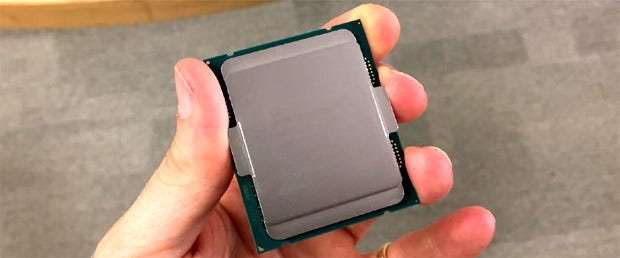Incoming: some excellent new gaming CPUs from Intel
Ermegerd, some good Intel news...
I’m jumping the gun just a little but a few of you have sent emails on precisely this subject and there’s a significant quantity of fairly solid info out there, so let’s talk about the shape of all things CPU and gaming. AMD’s Ryzen chips have very obviously been the big news thus far this year. But completing the picture for the next six months or so is what will shortly amount to the most significant update to Intel's CPU line up from a gamer’s perspective in about five years. For once, it’s going to be unambiguously good news...
In short, this is what's happening in about a month's time to Intel's mainstream desktop CPUs. Currently, gaming-relevant Intel CPUs come broadly in three flavours. At the bottom you have dual-core, quad-thread chips (that’ll be the Core i3). Next up is quad-core with quad-thread processing (Core i5) and at the top quad-core and support for eight threads (Core i7). Yes, there are one or two odd-ball dual-core / dual-thread chips with an unlocked multiplier that have a certain gaming appeal in some contexts, but that’s about the size of it.
Well, get a load of this. Intel’s next mainstreamers will be quad-core and quad thread at Core i3 level, six-core and six threads at Core i5 level and six cores with 12 threads at Core i7 level.
So that’s two more cores at every level. Now, one might argue that more than four cores or threads doesn’t make much difference in most games. That may be true. But even if more than four cores makes no difference in any games, this remains good news. Because you can now get four cores in the cheapest Core i3 format.
For my money, I reckon a few more cores are already worth a little extra money even with today’s games and that’s only going to become more true over time. So I am very excited by the prospect of an affordable six-core CPU that packs what remains the best per-core gaming performance you can buy, which is an Intel Core, er, core.
Specifically, the leaked roadmaps include a Core i5-8400 which is a six-core CPU and if Intel’s current pricing is any guide should come in under £200 / $200. The unlocked K Series version, the 8600K, will hopefully be under £250 / $250.
For reference, these chips are all part of the upcoming Intel 8th Generation Core update and the new four and six-core desktop chips I’ve been talking about are based on a refreshed 14nm CPU architecture known as Coffee Lake.
If there is a confusion, it’s that for reasons unknown to science Intel has apparently decided the 8th Generation update will also contain some refreshed previous-gen Kaby Lake parts as well as some shiny new 10nm CPUs known internally at Intel as Cannon Lake. So to recap, Intel’s 8th Generation CPU offering will actually contain three quite distinct generations of CPU design, though I think the Kaby Lake and Cannon lake models will mostly be things like low power and mobile CPUs (some of which have indeed already been officially revealed), so won’t actually make the desktop offering more confusing.
If this sounds ridiculous, I like to think that it’s Intel’s world-beating product planners at their finest. The updated quad-core and six-core desktop chips detailed above, and of most interest to we gamers, are uncharacteristically welcome and hard to fault as on-paper propositions. So, the planners had to find a way of making the 8th Generation infuriating, in typical Intel fashion. And they’ve done it again.
It’s also worth noting that as part of all this, quad-core laptop CPUs will also be much more accessible. By that I mean both more affordable and found in smaller form factors, both of which will be welcome for gaming on the go.
Finally, there’s the question of what all this means for the ongoing war between AMD Ryzen and Intel Core. Prior to Coffee Lake, the AMD Ryzen value proposition was so stellar that for my personal usage I would have been happy to overlook some occasional gaming performance patchiness.
An affordable six-core chip from Intel makes the choice a lot tougher for an all-purpose rig and I suspect may well turn out to be an absolute no brainer if gaming performance is a clear priority. I have a feeling a high-clocked six-core / six-thread Intel CPU could be pretty epic for gaming. On the other hand, there may well still be value and platform considerations, such as PCI Express lane count, that could tip the choice in favour of AMD.
However finely balanced it all turns out, or doesn’t for that matter, the net result will almost certainly be significantly better gaming CPUs than just a few months ago for the same or less money. Which is nice.
Oh, and as for availability of all these new Core i3, i5 and i7 mainstream desktop chips with more cores, we're talking early October.








